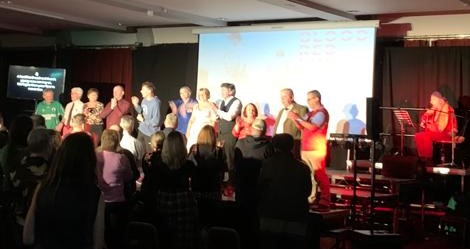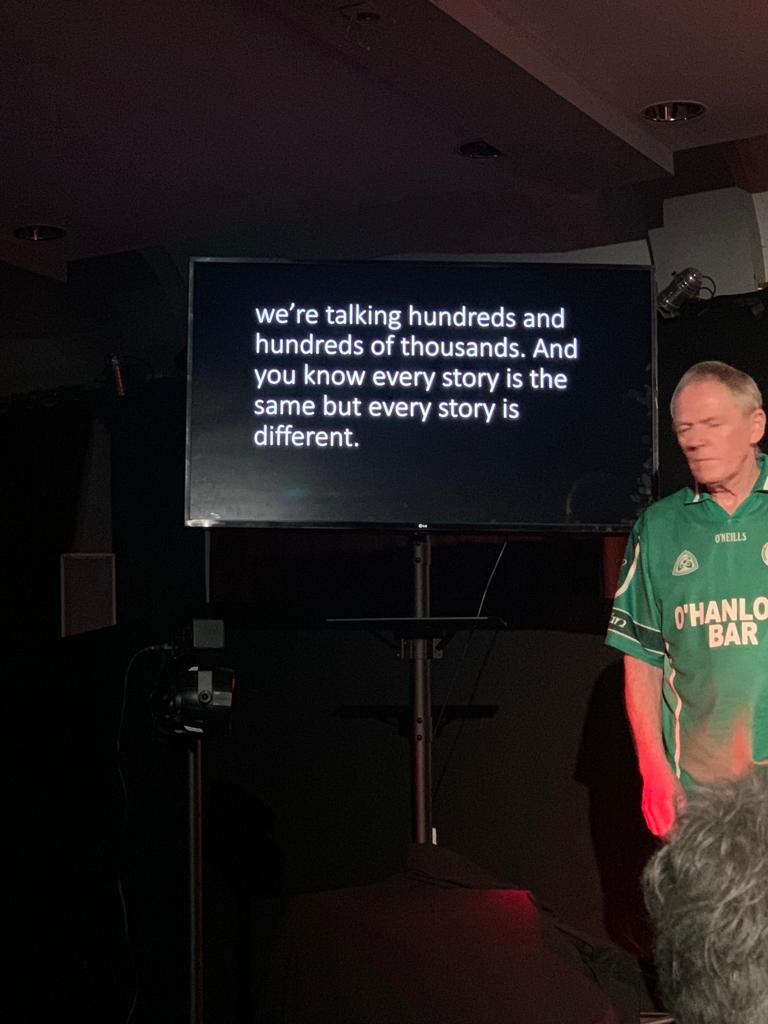When Memories May Be Painful
Zibiah Loakthar, our Cuimhne Coordinator writes:
This month, our team were kindly invited by the London Irish Centre to Camden Square to see Blood Red Lines presented by ART27 Scotland in association with Our Land Productions.
Blood Red Lines is a piece of verbatim theatre, constructed from testimonies of 11 men and women whose lived experience is a part of the story of the peace and reconciliation process in Ireland. It is a collection of authentic voices, powerful, compelling, meaningful.
 The cast introduce themselves in the first half, sharing life reflections, family anecdotes and memories of growing up in the Republic of Ireland, often with humour. The audience warm to, relate with and connect with each of the cast.
The cast introduce themselves in the first half, sharing life reflections, family anecdotes and memories of growing up in the Republic of Ireland, often with humour. The audience warm to, relate with and connect with each of the cast.
The impact in the second half where cast members unroll painful memories of how their lives became directly affected by conflict. The untimely losses of parents, grandparents, siblings, friends and partners is then felt keenly by the audience as they confront transgenerational impacts of violence.
Participation
Participation is a way of remembering loved ones lost in violence ensuring they are not forgotten, giving voice to impacted families. The cast support each other in the emotional recounting of memories, offering a friendly hand to one another as each take turns to step into the middle of the stage to speak and the solidarity is palpable.
“with empathy there comes a realisation of the need for change”
(Art27 Scotland Co-Director Helen Trew)
 This kind of theatre aims to foster empathic understanding. Personal voiced testimonies enable people to seen as individuals and counter the dehumanising of people as “victims”, as “them” rather than “us”.
This kind of theatre aims to foster empathic understanding. Personal voiced testimonies enable people to seen as individuals and counter the dehumanising of people as “victims”, as “them” rather than “us”.
One of the youngest cast members Tracey Mulholland explains her aim is in part “to highlight trans-generational trauma …the impact that the conflict still has on this generation and the very real risk that it may be passed down to the next generation if solutions are not found on how we deal with our past”.
“I never want the horror of the past to repeat itself. It is important to me that the next generation learn from my story and the many heart-breaking stories through the education system…” (participant Mary Casey)
With beautiful music composed by Tommy Sands entwined with compelling testimonies, the stories of ordinary people going through extraordinary struggles to understand conflict in Ireland are laid before the audience. It is a hard watch.
The poignant musical refrain “It’s a hard hard road but we keep on keeping on/ The love you gave will never be gone/ A hard hard road and there’s young ones coming on/ We’ll give them your love to remember” has a wistful and haunting but also hopeful lilt, reminding us all of the power and importance of sharing memories.
Past experiences
In our Irish in Britain community, there will be people caring for people living with dementia with lived experience of conflict in Ireland. They may find it helpful to seek out plays, films and oral testimonies to understand better the kind of past experiences people may have lived through, but perhaps have never spoken about.
Maura Traynor, one of the cast, shares how after her father’s death due to a no warning bomb in Taynor’s bar her mother feared speaking about it. She was worried it might lead family members to become involved in revenge. When family members began to share memories after contact from the Historical Enquiries Committee, Maura’s mother was living with dementia and could not talk about it.
With the onset of dementia, recent memories may recede and earlier memories become foregrounded; vivid memories of past lived experience become confused for current reality. Factual memories may recede whilst emotional memories linger; people may have powerful emotional reactions to stimuli without understanding why.
Resources
Seeking out resources that help us understand the past may help us to understand the behaviour and emotional reactions of people we care for, communicate sensitively and offer better care.
In reminiscence activities, we can be mindful about caring for everyone’s wellbeing and treading softly. Recounting memories of unhappy, frightening, upsetting times may distress not only recallers but those listening too. However, steering wide of any expression of painful life experiences might inadvertently cause harm as people may feel their life experiences are dismissed and feel themselves judged, dismissed and rejected.
Offering outlets for the expression of a wide range of human emotion can be important. We can recognise that connecting with stories eliciting sadness may sometimes feel cathartic. We may enjoy jolly yellow music but not all the time. We may also enjoy music that is not saccharine, that enables us to connect with deeper, blue-toned human emotions like sadness too.
People living with dementia may have yearning to remember people connected with painful emotions and to connect as humans with the rainbow of human emotions, whether or not such yearning can be expressed without frustration in words.
By becoming more informed about the past, carers can help co-navigate meaningful life memories with sensitivity, being therapeutic whilst taking care not to undertake roles of therapists. Verbatim Theatre like Blood Red Lines can help us become more informed.
Culture
 Art27 focuses upon “cultural rights as a driver of citizenship and democracy” with a mission based upon Article 27 of the Universal Declaration of Human Rights: “Everyone has the right freely to participate in the culture of their community”.
Art27 focuses upon “cultural rights as a driver of citizenship and democracy” with a mission based upon Article 27 of the Universal Declaration of Human Rights: “Everyone has the right freely to participate in the culture of their community”.
Blood Red Lines was created in Newry as part of Derry Playhouse’s contribution to Peacebuilding. Supported by The Peace IV Programme, a European Union initiative designed to support peace and reconciliation in Northern Ireland and the border counties of Ireland.
First shown at Newry Town Hall back in February 2019, the group welcome opportunities for national and international touring.